Food & Drink
More than a Taco – The Tortugas Cuban Grill
Published
3 years agoon
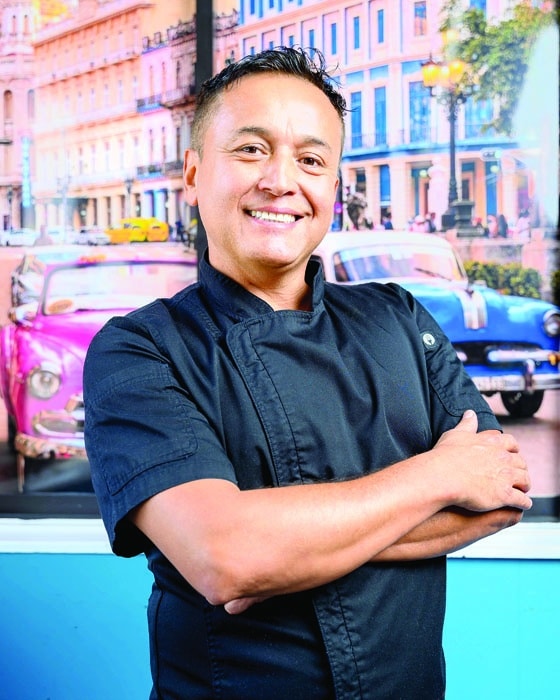
Celebrate Hispanic Heritage Month by seeking out cuisine from a diverse mix of Latin countries – you won’t be disappointed.
Photos by George Hunter.
Many Americans aren’t aware of the complexities of many cultures across the globe. For example, not all Latin food is spicy or comes in a tortilla. As Hispanic Heritage Month approaches, please don’t think of Taco Bell as the place to sample the cuisine of more than 60 million people on the planet.



With Spanish being the second most spoken language in the world, the Pew Center estimates that there are more than 500 million Hispanophones across the globe. That is, people who speak Spanish — whether natives or those for whom it is their second language.
To honor the diversity within the Latinx culture, Peachtree Corners Magazine met up with Victor Melendrez at his restaurant Tortugas Cuban Grill in Peachtree Corners. He was working on a big catering order for a client who was looking for authentic Cuban fare.


“That’s what you get here,” he said, adding that during the holiday season he’s overrun with orders for lechon asado (roast pork), arroz congri (Cuban rice and black beans) and yuca con mojo (cassava with garlic sauce).
Melendrez has been in the food service industry for more than 25 of his 53 years. He and his family emigrated from Guadalajara, Mexico when he was young. The family settled in California, like many Latinos looking for a better future.


Authenticity and commitment keep the business strong.
In 2005, Melendrez visited family in Georgia and realized that the cost of living was a lot lower than in the Golden State. “At one point, the economy was getting really bad, especially real estate,” he said. “When I found out that you can buy a house for $130,000 here, I was ready to move.”
His first Georgia restaurant was in Buford where he had a partner in a different Cuban restaurant. He chose that cuisine because it was in the Caribbean style that he enjoyed. Besides, there are so many Mexican restaurants everywhere, he wanted to stand out.
The business relationship didn’t go well, and he decided to venture out on his own.
“Partnerships are tough,” he said. “I’m not sure that’s something that I’d do again.”
Researching potential areas, Peachtree Corners appeared to have the demographics he was looking for: high disposable income and not overrun with restaurants. But before he could find success, Melendrez had to educate his customers.
An introduction to Cuban cuisine
“I noticed right away that not a lot of people are familiar with Cuban food,” he said. “At the beginning, especially at this location, a lot of our customers said the food was excellent, but ‘we never got our chips and salsa.’”
Melendrez smiled at this. He tried to explain the difference between different Latin American cuisines, but many patrons wrongly assumed that they were all similar to Mexican food.
He explained that it was like expecting chips and salsa at an Italian restaurant. It still didn’t always sink in, but he didn’t let that frustrate him. He decided to let the food do the talking.
If you asked people what they know about Cuban cuisine, they’ll mention the Cubano — a variation of a ham and cheese sandwich that usually includes pickles and roast pork. It more likely originated in cafés catering to Cuban workers in Tampa or Key West than on the island nation itself.
“I like to talk to customers. And with some regulars, I try to get them to order something besides the sandwiches,” he said. “I’ll describe the ingredients and how it’s prepared, and most will try something they’ve never had before. I’ve never had anyone who said they didn’t like the new dish.”
Now, after a few years, he doesn’t have to try so hard with most dishes, but on occasion he brings out samples of something like oxtails or empanadas filled with guava and cream cheese. Those have become such a hit that he sells more than 60 pounds of oxtails a week and the sweet empanadas are outselling the savory ones.
Melendrez is convinced that sticking to authentic ingredients, authentic methods and refusing to cut corners has kept him doing well in spite of the COVID pandemic.
“We had to close for a few months, like everyone else,” he said. “But we are doing well now.”
Food, supplies and staff are costing much more, but Melendrez said he’d rather bring in a lower profit than sacrifice service or quality. It would cost less in food and manpower to purchase pre-made empanadas, or frozen or canned ingredients, but he insists on using fresh.
“I can tell,” he said. “It doesn’t taste like Mama or Grandma made it.”
And he has the same philosophy with people. He’s gone up in pay for his loyal employees rather than turn the restaurant into a revolving door. “I don’t want a customer to say the same dish they had last week tastes different today,” he said.
Melendrez takes his cooking seriously. In addition to hiring a Cuban chef who stressed the training he had already, he has traveled to Cuba and learned from restauranteurs and home cooks alike. “I spent days with people cooking and getting more involved with the culture and the ingredients, and that’s why a lot of the people come here,” he said. “When they compare us to other Cuban restaurants — even though I’m not Cuban — they always go, ‘Oh my god, this reminds me of grandma’s cooking’ or ‘…mama’s cooking.’ It’s because, basically, I’ve been learning from mamas and grandmas from Cuba.”
He added, “I don’t want a native Cuban to come in and say that this doesn’t taste like home.”
Right where he belongs
The restaurant’s décor is subtly Cuban. Pictures of the streets of Havana, as well as popular beaches and famous nationals, adorn the walls. He even has a photo of a former chef with President Jimmy Carter at the entrance. “When President Carter went to Cuba, he was one of the main chefs who served their meals,” said Melendrez.
On weekends, he brings in live music to help with the island vibe.
These days, Melendrez spends almost all his time at Tortuga Cuban Grill. “It’s good I just live two miles away,” he said. And, he added, it’s a labor of love.
Before the pandemic hit, he may have thought of expansion, but Melendrez said he’s content feeding the people of Peachtree Corners the most authentic Cuban cuisine this side of Havana.
“I can’t see myself doing anything else,” he said.
Related
Arlinda Smith Broady is part of the Boomerang Generation of Blacks that moved back to the South after their ancestors moved North. With approximately three decades of journalism experience (she doesn't look it), she's worked in tiny, minority-based newsrooms to major metropolitans. At every endeavor she brings professionalism, passion, pluck, and the desire to spread the news to the people.

Food & Drink
Four Peachtree Corners Restaurants Take Part in Gwinnett Burger Week
Published
3 months agoon
March 10, 2025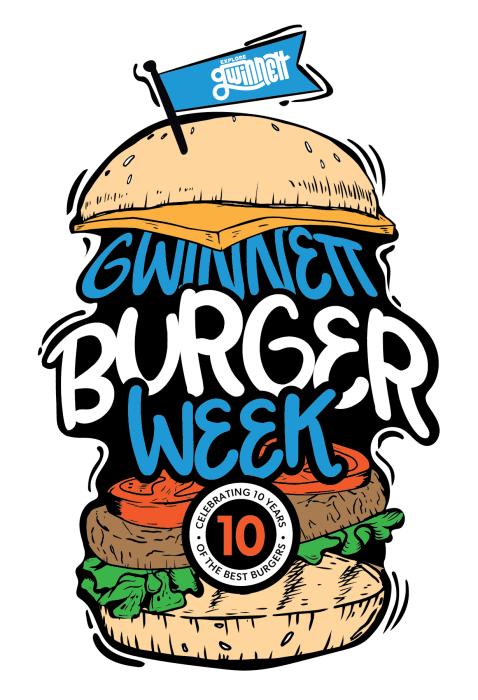
Explore Gwinnett celebrates a decade of culinary creativity with $10 chef-crafted burgers at 23 locally owned restaurants
Explore Gwinnett, the official tourism organization of Gwinnett County, is celebrating the 10th anniversary of its popular Gwinnett Burger Week. Making its anticipated return March 17–23, 2025, the event invites burger lovers to enjoy exclusive, chef-crafted creations for just $10 at 23 locally owned restaurants across the county.
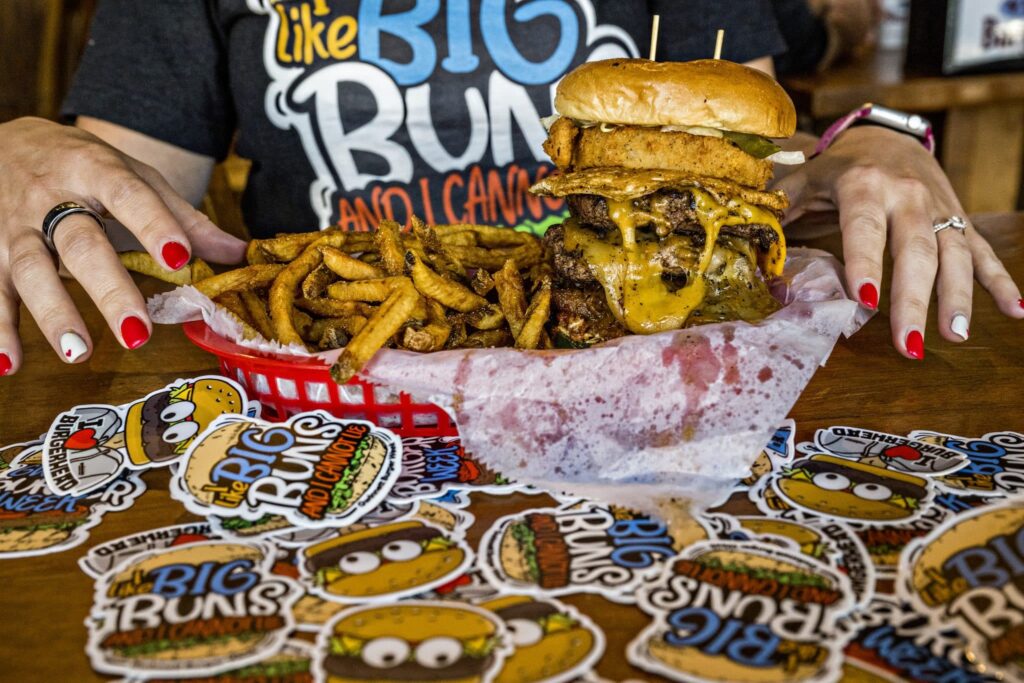
“We are proud to celebrate a decade of Gwinnett Burger Week and the incredible talent of some of our very best local chefs,” said Lisa Anders, chief operating officer of Explore Gwinnett.
“What started as a way to highlight locally owned eateries has grown into a beloved tradition, and we cannot wait for the community to see what we have in store for them this year!”
Throughout the week, each of 23 participating restaurants will feature an exclusive, off-menu burger.
Peachtree Corners highlights include:
- “The Alma” at Marlow’s Tavern — a perfectly seasoned and grilled burger with salsa verde, pepper jack, fried jalapenos, avocado, tortilla strips, lettuce, tomato and onion on a buttered sesame brioche bun.
- “The Blue Flame” at LOL Burger Bar — a 5 oz. premium beef patty topped with homemade macaroni and cheese, pulled pork, blue cheese crumbles and the restaurant’s secret sauce to add a bit of spice.
- “Fired Up Burger” at Firebirds Wood Fired Grill — a wood-grilled burger, lettuce, tomato, pepper jack cheese, jalapeno bacon jam, fried onions and tangy mayo topped with fried pickles garnish.
- “K-BBQ Burger” at Stäge — an Angus beef smash burger with Korean BBQ glaze, roasted cheese corn, house-pickled veggies and gochujang mayo on a sesame brioche bun.
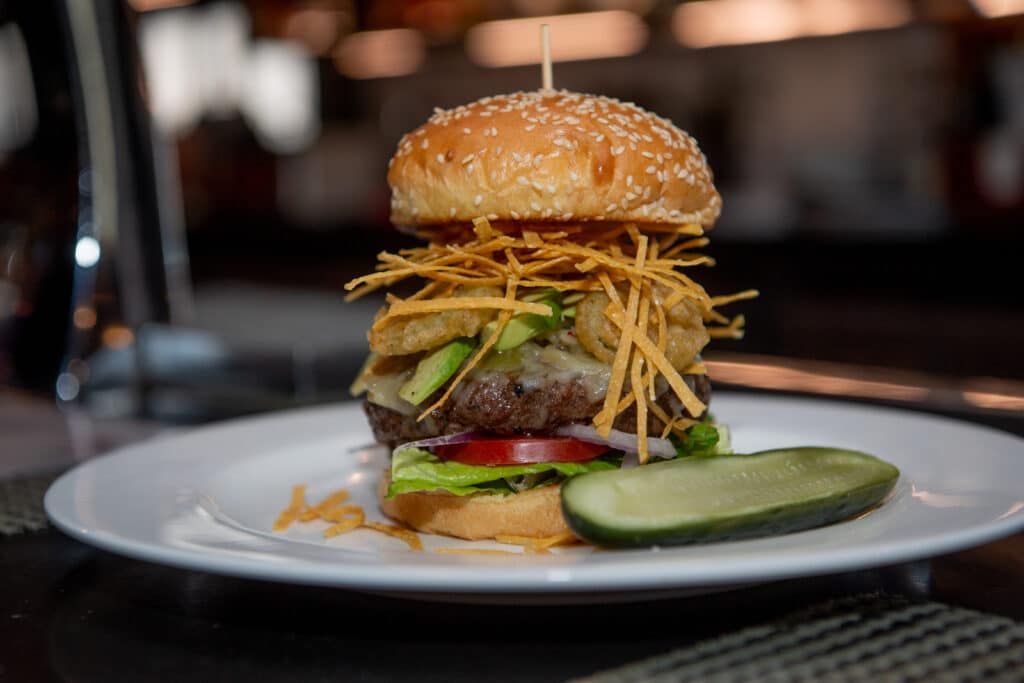
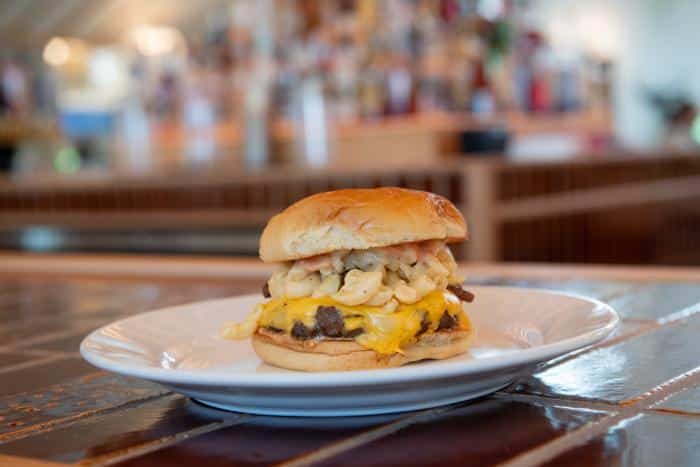
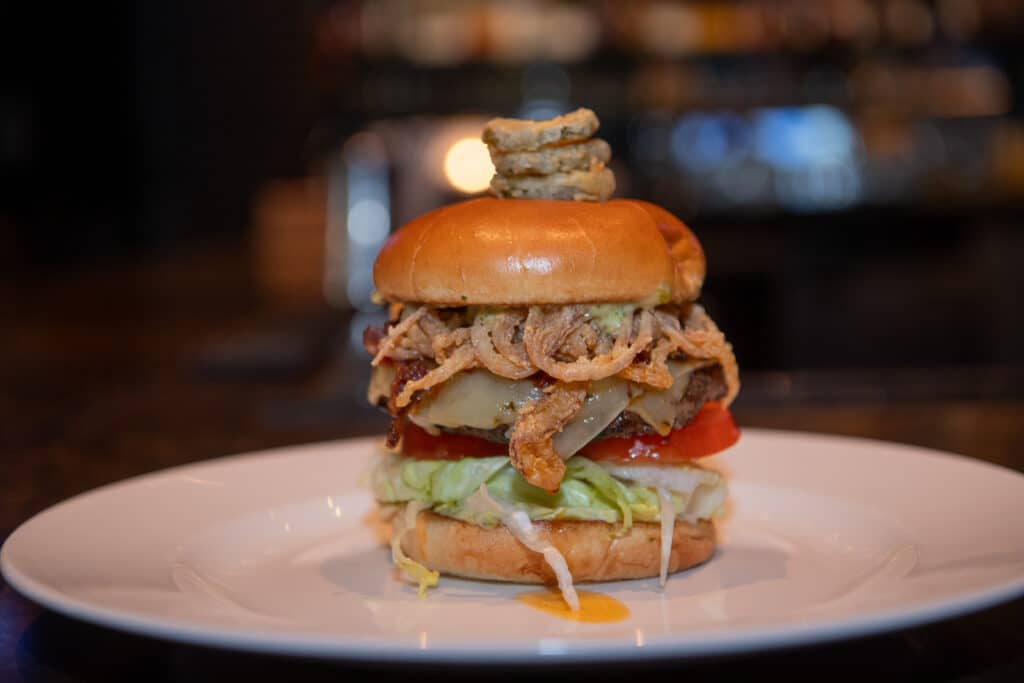
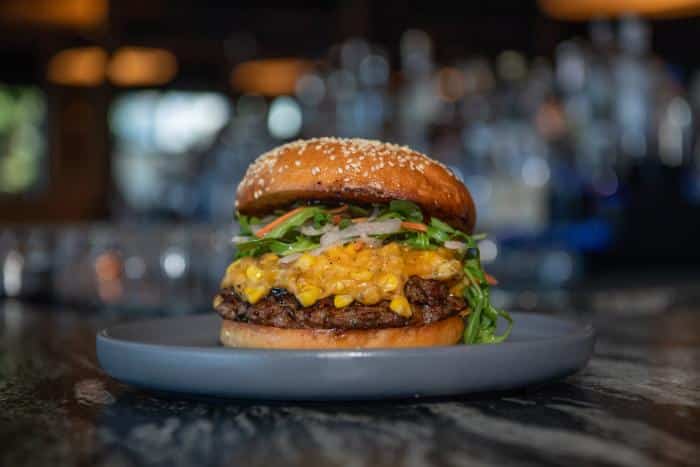
Gwinnett Burger Week digital pass
Back for its second year, the Gwinnett Burger Week Digital Pass encourages diners to check in at participating restaurants and earn points throughout the week, which are redeemable for prizes.
Each check-in is worth one point. Points can be redeemed for exclusive Gwinnett Burger Week merchandise from Explore Gwinnett, including restaurant gift cards, t-shirts, totes, sicker packs and a special edition 10th anniversary burger sticker designed by Lawrenceville-based artist Max Eve in celebration of this milestone.
Diners can also vote for their favorite burger by uploading an image of their receipt to the Gwinnett Burger Week website.
The Wall of Fame
Participants who track their dining experience at 10 or more restaurants throughout the week will be inducted into the Gwinnett Burger Week Wall of Fame with their photo published on Explore Gwinnett’s website.
“Our 10th anniversary milestone reflects the passion and creativity of Gwinnett County’s culinary community and the enthusiasm of all those who make this event a success year after year,” said Anders. “We can’t wait to indulge in the exclusive $10 burger creations ourselves, as we toast to 10 years of one of our favorite events!”
More details
To sign up for the Gwinnett Burger Week Pass, visit ExploreGwinnett.org/Gwinnett-Burger-Week/Burger-Week-Prize-Pass and provide the participant’s name, e-mail address and mobile phone number. A link will be sent to the participant’s phone, allowing them to access the pass and add the pass icon to their home screen.
For a full list of participating restaurants and limited-time burger offerings, visit exploregwinnett.org/gwinnett-burger-week.
Stay up-to-date on the latest Explore Gwinnett news by following @ExploreGwinnett on Instagram or ExploreGwinnett on Facebook. Diners are encouraged to share their experience on social media by using the hashtag #GwinnettBurgerWeek.
Related
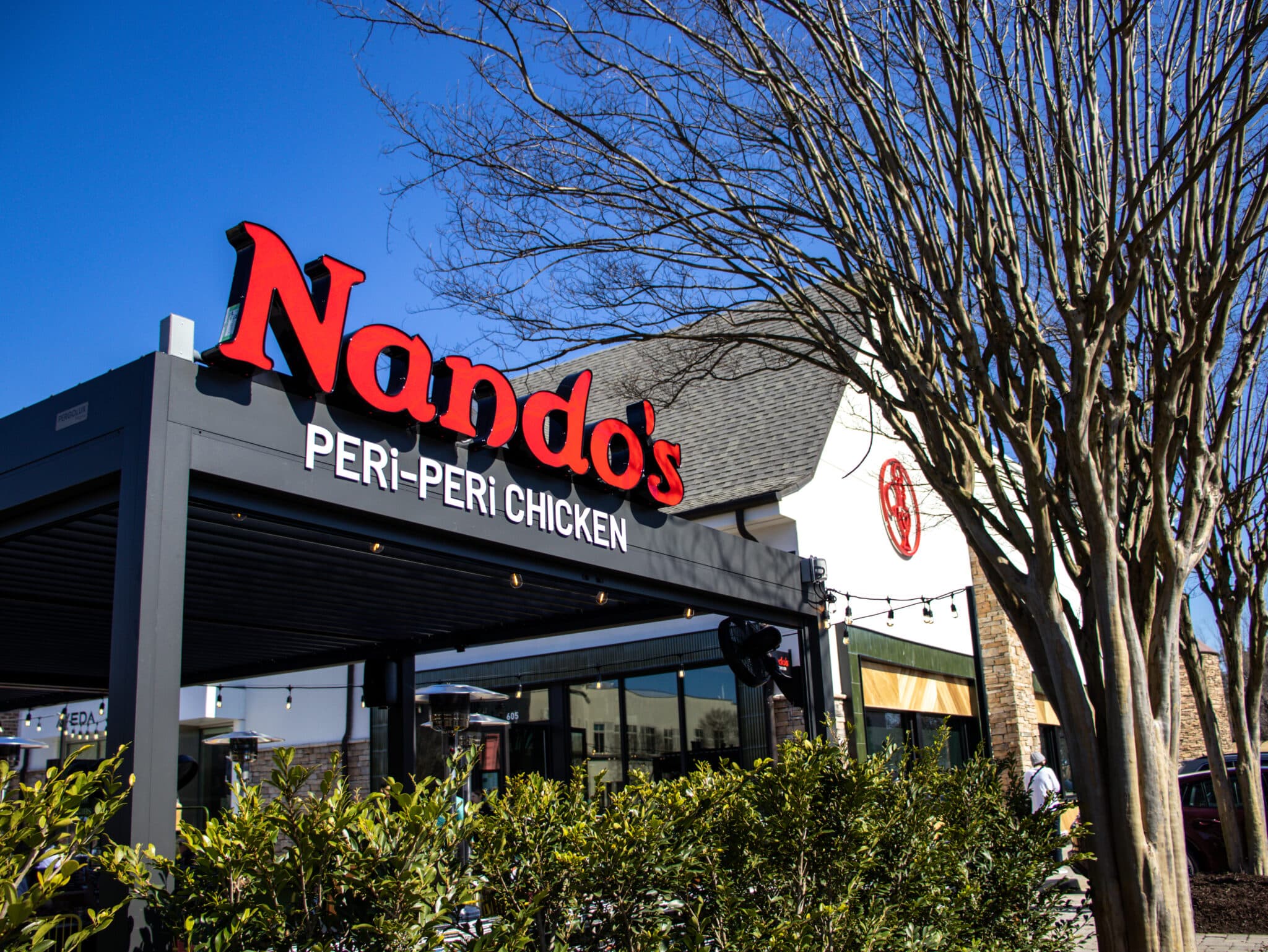
The South African fast-casual favorite expands in Georgia, bringing its signature flame-grilled spice and art-filled interiors to Peachtree Corners
Less than six months after opening its flagship Atlanta-area location at Perimeter’s High Street, world-famous South African restaurant brand Nando’s PERi-PERi opened its second Georgia restaurant to the public — for lunch and dinner service — on Tuesday, February 25.
Located within the premier mixed-used development and outdoor lifestyle center The Forum Peachtree Corners, Nando’s PERi-PERi is ready to offer its beloved flame-grilled chicken dishes, signature hot sauces and more to Atlanta-area locals and visitors alike.
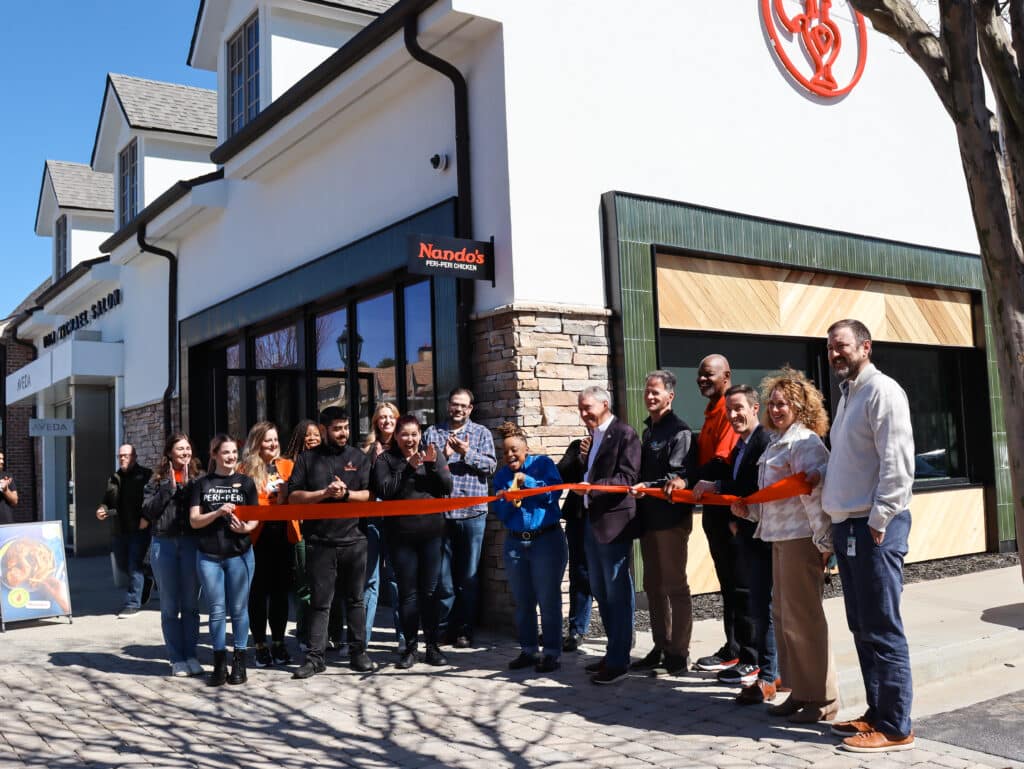
“Atlanta has shown us so much love with the opening of our first location at High Street, so we couldn’t be more thrilled to expand our footprint in Georgia by bringing Nando’s to The Forum Peachtree Corners,” said Sepanta Bagherpour, chief brand officer at Nando’s PERi-PERi. “As a brand so rooted in community, we are excited to be a part of this lively hub where food, fun and connection unite.”
PERi-PERi flavor
Nando’s is known around the world for their flavorful flame-grilled chicken, and the concept’s popularity can be traced to PERi-PERi — or African Bird’s Eye Chili — the heart and soul of the Nando’s experience.
“We marinate our chicken in PERi-PERi for at least 24-hours, so the flavor goes right through to the bone,” Bagherpour explained. “Then we grill it over an open flame and baste it with PERi-PERi sauce to the customer’s preferred spice level. That’s what makes our chicken so addictive.”
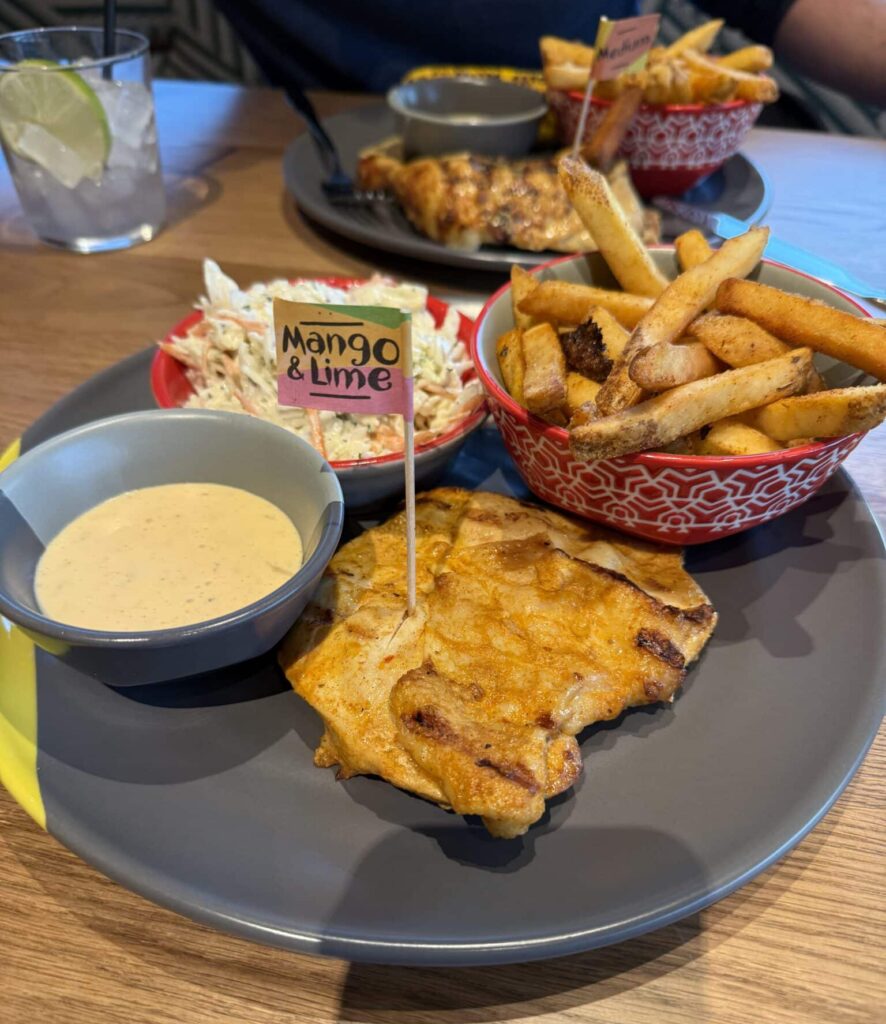
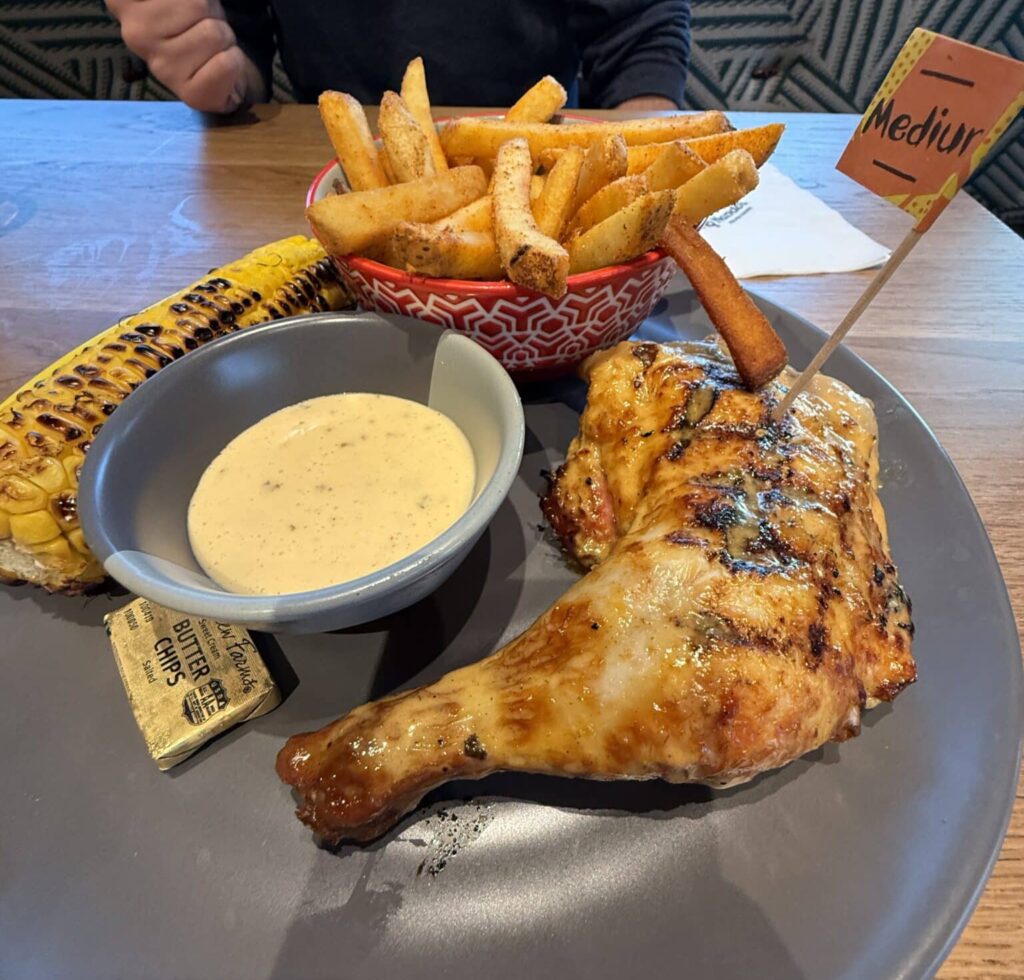
Nando’s sources its PERi-PERi in Mozambique, Zimbabwe, Malawi and South Africa via a network of 1,400 local farmers who are empowered with upfront access to funds, equipment and seedlings. And before the growing season even starts, they are guaranteed a fair price purchase commitment.
Warm space and friendly service
Nando’s intensely loyal following has not only been driven by its high-quality food, but also by its friendly service presented in a relaxed atmosphere that elevates the typical fine-fast casual experience.
Every Nando’s location is uniquely designed with earthy textures and vibrant colors that reflect its sunny African heritage while retaining a sense of place in which it lives and breathes.
The restaurant’s location in Peachtree Corners is no exception.
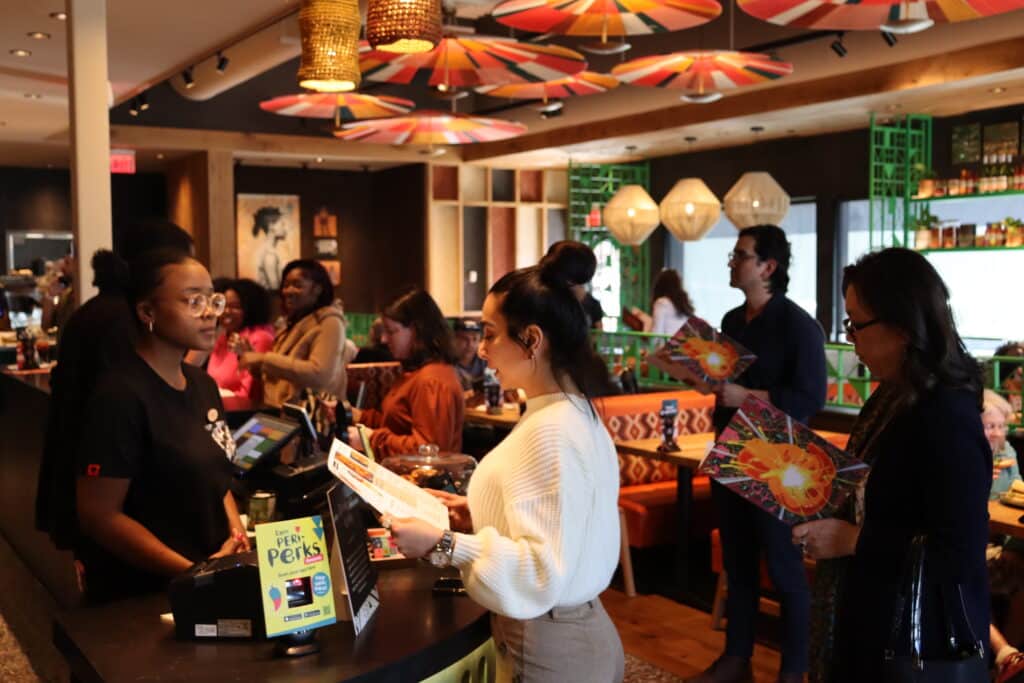
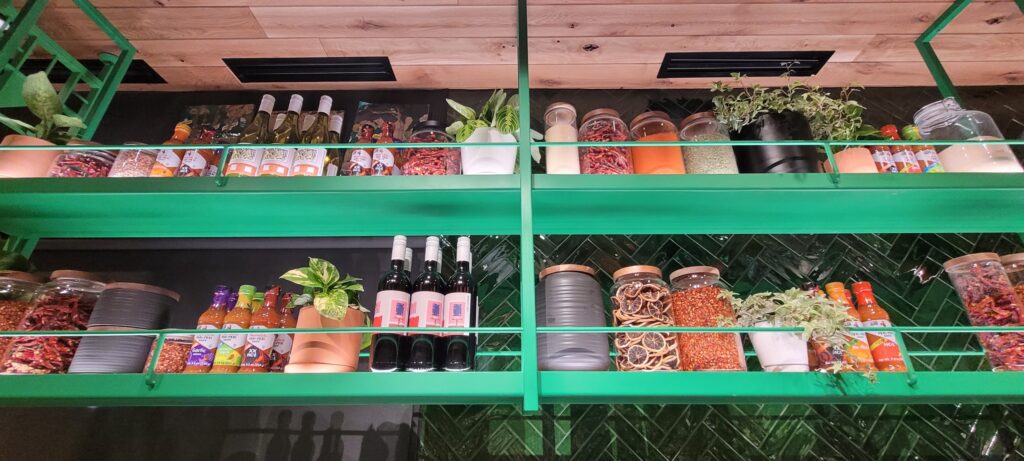
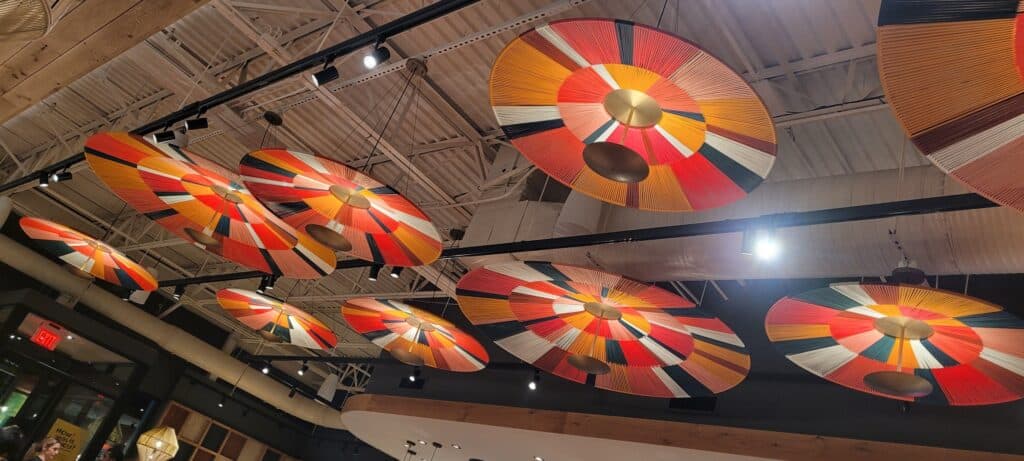
Designed by Fusion, Nando’s at The Forum is packed with custom lighting, furniture and authentic art imported from South Africa, showcasing the strong ties to its cultural heritage.
On a prominent corner within the newly refurbished open-air development, the new Nando’s visibility is boosted by its large, canopy-covered outdoor seating area. Inside the restaurant, guests will feel warm and welcome with design elements that balance the contrast of raw, textural finishes and saturated hits of color and pattern.
A great fit for The Forum
“As we continue energizing The Forum with new experiences for guests, Nando’s PERi-PERi stood out as an international favorite that would excite the community,” said Adam Schewgman, director and head of retail leasing at Jamestown. “From the inventive menu options to the meticulously selected design elements, we’re looking forward to giving visitors a taste of South Africa right here in Peachtree Corners.”
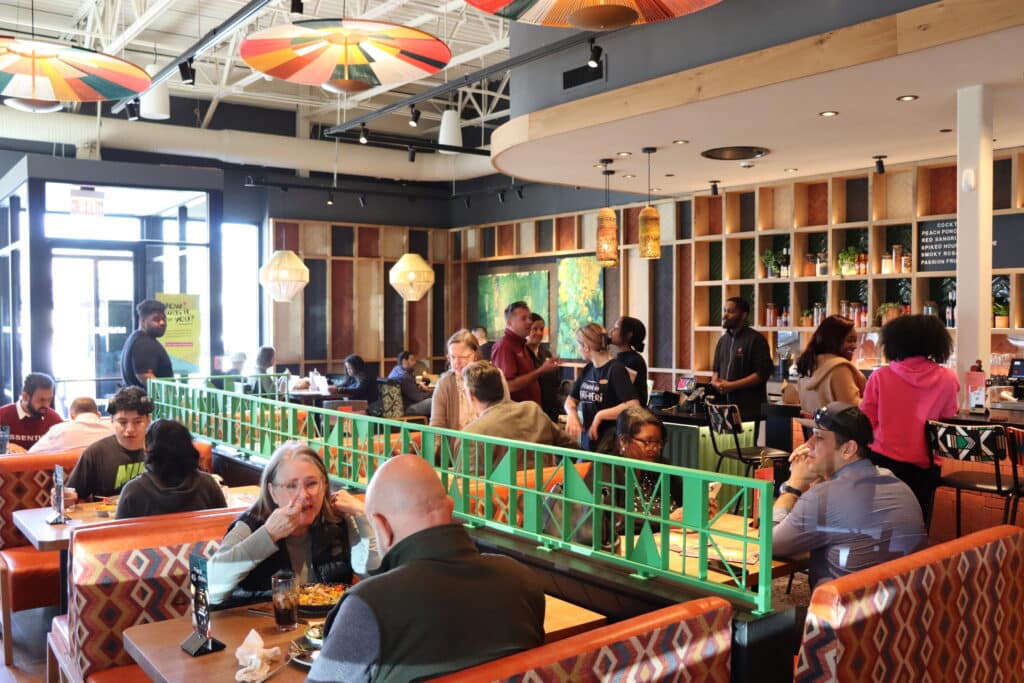
About Nando’s PERi-PERi
Since making its 1987 debut in Johannesburg, South Africa, Nando’s has spread its flame to legions of fans in 24 countries on five continents. The company entered the US market in 2008 with the opening of its first location in Washington, D.C., and now operates nearly 50 restaurants in and around Virginia, Maryland, Washington, Chicago, Texas and now Georgia.
For more information visit nandosperiperi.com or follow @nandosusa on Instagram.
Related
Food & Drink
Foodie Faves: Suburban Charm and Global Tastes in Peachtree Corners
Published
3 months agoon
February 25, 2025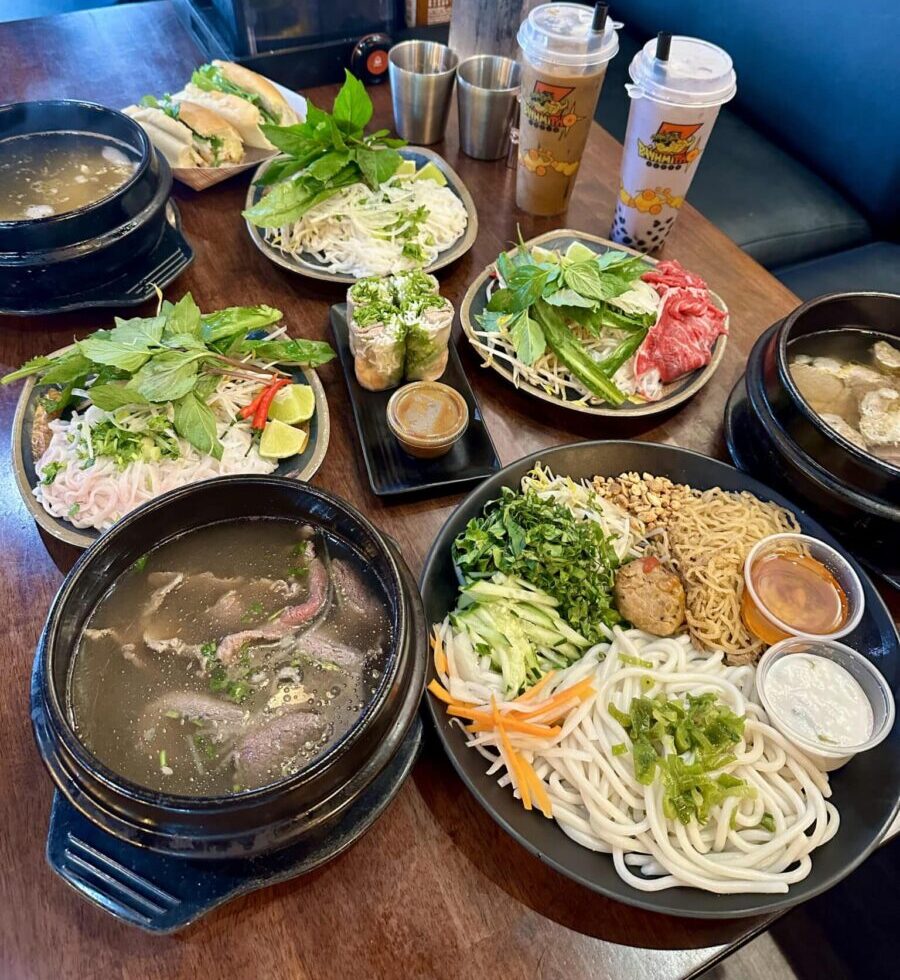
Metro Atlanta’s food scene is a tapestry of flavors, cultures and culinary creativity. Long known for its traditional Southern fare, recent years have also seen an increase in the number of restaurants — both independent and franchise — showcasing international, fusion or new South cuisines opening throughout the city.
While the busy food halls and trendy eateries in Midtown and Buckhead may get a lot of press, the northern suburbs, including Peachtree Corners, Norcross and Duluth, are experiencing a culinary Renaissance of their own.
Dozens of new and exciting restaurants have opened in Peachtree Corners over the last few years, with more planned for 2025.
Reflecting the eclectic tastes of a growing community, places like Stäge, H&W Steakhouse, and Fire & Stone Italian Pizza Kitchen have joined long-standing favorites such as J. Alexander’s and Taqueria del Mar in finding a following.
The upcoming scheduled openings of Golestan, Sei Ryu and the multi-restaurant lineup at The Forum’s new Politan Row has only added to the buzz around dining in Peachtree Corners.
With so many incredible places to choose from, figuring out where to enjoy your next lunch or dinner out can be a challenge. So, we turned to a few experts for help. And who knows the local food scene better than the influencers who get out, taste and share their thoughts on the latest and greatest spots in the city?
The following foodies answered the call to share some of their picks for must-try restaurants in Peachtree Corners and Norcross, with choices that offer something for just about every taste.
From Southern favorites to sushi, seafood, steak and more, these are a few of the local restaurants to check out — or revisit — in 2025.
Lena Ahn (@atlbestbites)

Dahlia’s Restaurant & Porch
One of Peachtree Corners newest restaurants, Dahlia’s Restaurant & Porch serves Southern American fare in the heart of the city. The setting is casual, and they often have live music in the evenings, which is a nice touch. They also have a beautiful patio, so be sure to dine outside when you can to truly enjoy the facilities.
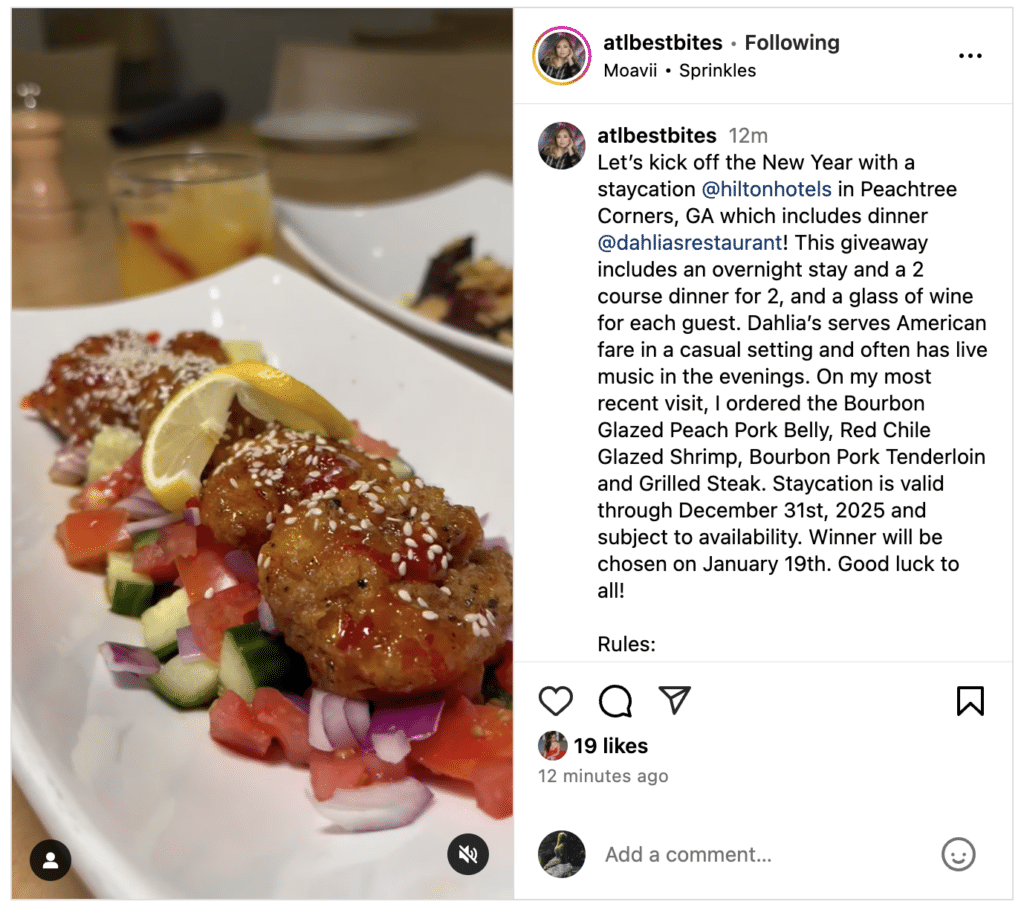
On my most recent visit, I ordered the Bourbon Glazed Peach Pork Belly, Grilled Steak, Red Chile Glazed Shrimp and Bourbon Pork Tenderloin. The shrimp was crispy and flavorful, and you can’t go wrong with steak!
Mai Le (@lemaitravel)

Stäge Kitchen & Bar
This was our third visit to Stäge Kitchen & Bar, and once again, it did not disappoint. The quality of the sushi here remains absolutely incredible. Every roll is fresh, flavorful and beautifully presented, showcasing the attention to detail that sets this place apart.
The consistency of the flavors and the impeccable service make it a standout spot. Whether you’re a sushi aficionado or just starting to explore Japanese cuisine, Stäge delivers an experience that keeps you coming back.
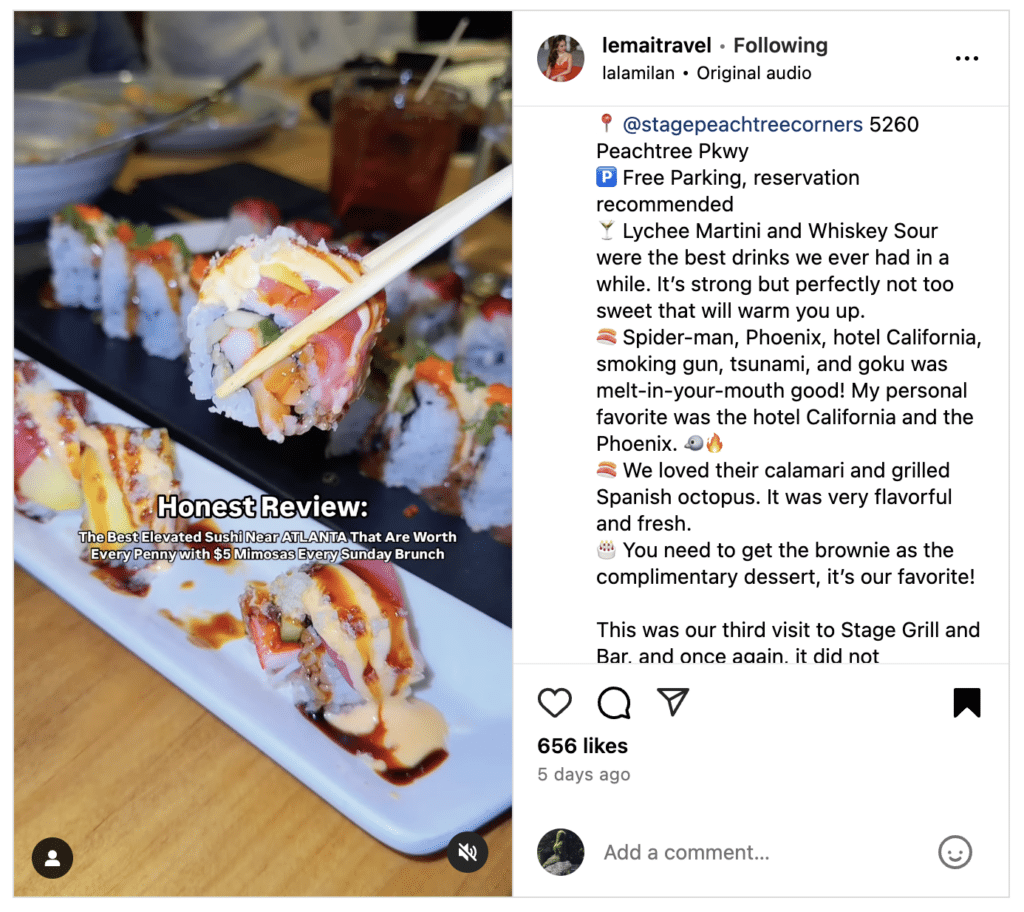
Highly recommend this gem for anyone seeking high-quality sushi in a welcoming atmosphere!
The Spider-man, Phoenix, Hotel California, Smoking Gun, Tsunami and Goku rolls were melt-in-your-mouth good! (My personal favorites were the Hotel California and the Phoenix.)
We loved their calamari and grilled Spanish octopus. Both were very flavorful and fresh.
The Lychee Martini and Whiskey Sour were the best drinks we’ve had in a while — strong but perfectly not-too-sweet that will warm you up.
And you need to get the brownie as the complimentary dessert; It’s our favorite!
Adam & Cole (@atlfoodiesofficial)

H&W Steakhouse
One of the BEST meals we had in 2023 and one of the best new restaurants we’ve dined at overall is hands down H&W Steakhouse in Peachtree Corners.
This stunning, fine-dining steakhouse is located 30 minutes outside of Atlanta and is one of the most beautiful restaurants we dined at [last] year.
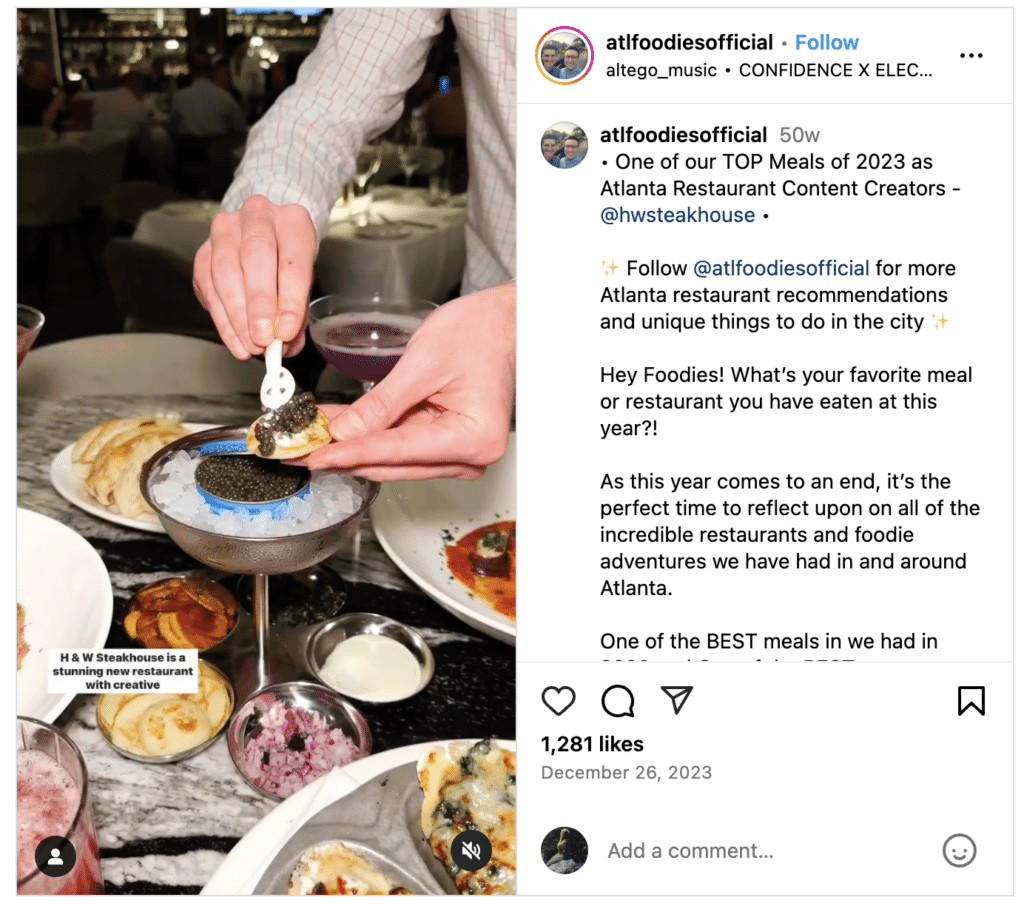
Serving everything from high-end steaks to luxury delicacies like caviar and A5 Japanese Wagyu, with over-the-top, tableside presentations, you will be absolutely blown away by your meal there.
You also have to end the meal with their famous Turtle Gelato Pie and Carajillo (a Spanish coffee cocktail made with espresso and liquor)! Both were absolutely phenomenal and a great way to end an amazing dinner.
Saadia Raja (@peachy_palate)

Pêche Modern Coastal
Good cheese needs good companions!
Our long overdue Girls’ Night Out led us to Pêche Modern Coastal where we had a cheesy good time.
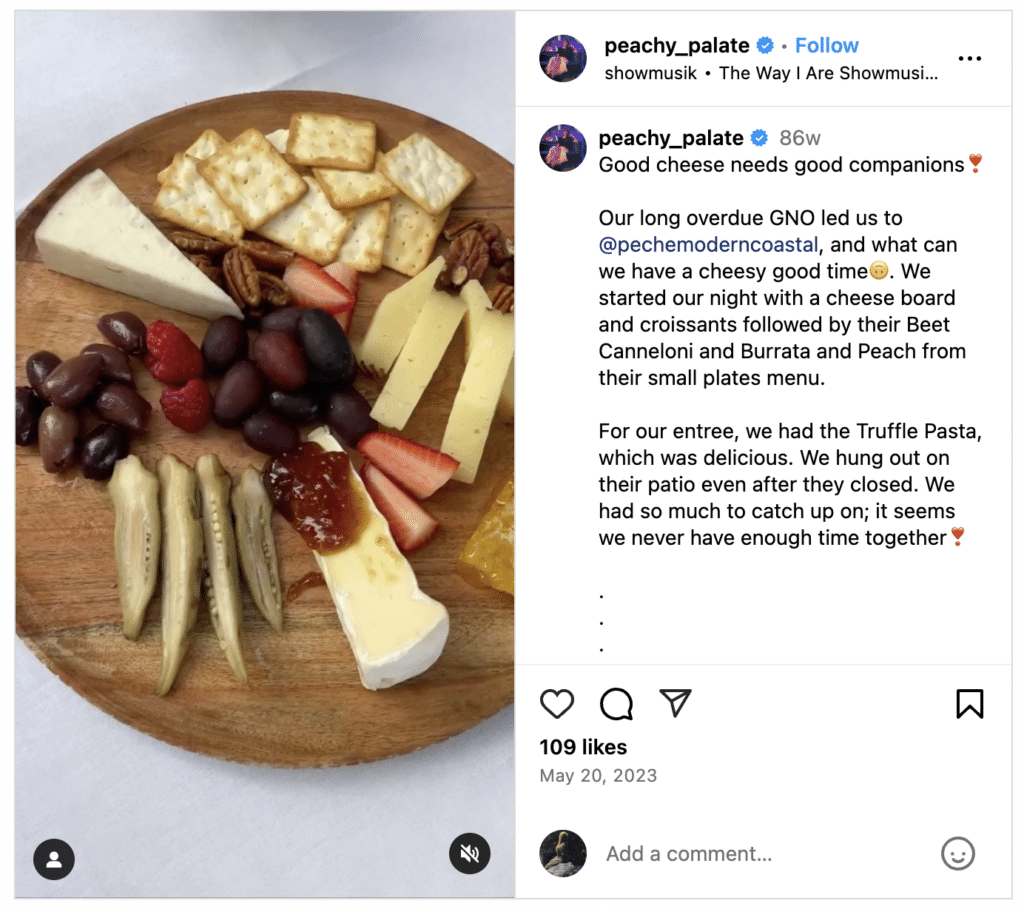
We started our night with a cheese board and croissants followed by the Beet Cannelloni and Burrata and Peach salad from their small plates menu.
For our entree, we had the Truffle Pasta, which was delicious.
I loved the patio at Pêche. We hung out [there] even after they closed. I can’t wait for spring and summer to come so I can enjoy it again.
Helen Dong (@_helenfoodie)
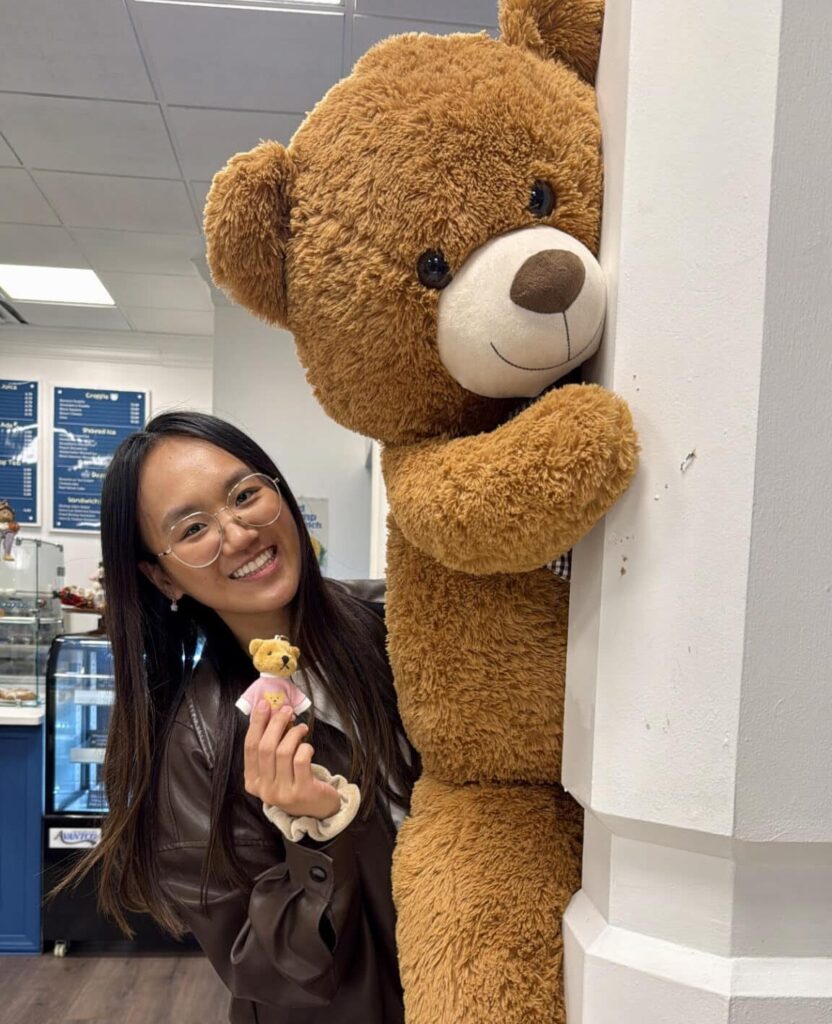
Super Banh Mi Pho
I finally got to try Super Banh Mi Pho, and I’m definitely coming back!
This Vietnamese restaurant has been on my list to try, and everything we got was so good! Some of my favorites are their banh mi and pho, which are made with fresh ingredients. The broth was so good, and adding in all the fresh ingredients made it taste even better!
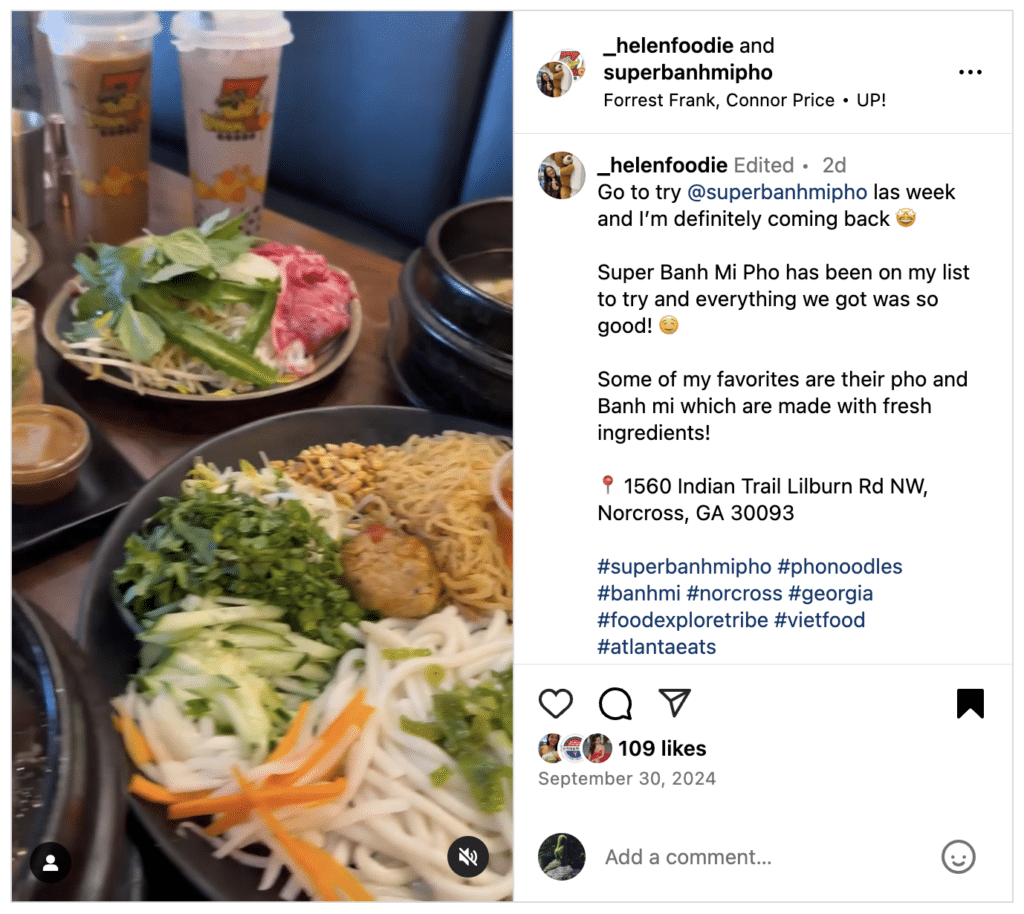
Editor’s note: Serving traditional Vietnamese dishes, the family-run Super Banh Mi Pho has developed a following among local foodies not just for its excellent food, but for its buzzworthy Dragon Ball Z décor, lively atmosphere and fun events.
This article originally ran in the February/March issue of Peachtree Corners Magazine. A digital edition of the publication can be found here.
Related
Read the Digital Edition
Subscribe
Keep Up With Peachtree Corners News
Join our mailing list to receive the latest news and updates from our team.
You have Successfully Subscribed!

MomoCon 2025 to bring 60,000 Fans to Atlanta for a Weekend of Cosplay, Animation, Gaming and Music

From Boardrooms to the Himalayas: Vandana’s Journey to Purpose and Growing with Intention [Podcast]

Local Special Olympics Pickleball Team Honored with State House Resolution

Music Matters Productions Expands Peachtree Corners Headquarters

Brandon Branham Honored for Transformative Leadership in Peachtree Corners

Guardians of the Jukebox to Play the VoxStage on May 31

Celebration and Community: ICAGeorgia Wraps Up School Year with Two Festive Events

“Geek Culture” Shines at 2025 MomoCon

Vox-Pop-Uli Launches RED Initiative for Veterans’ Support

The PCBA Awards $500 to Light Up The Corners at After-Hours Event

“Geek Culture” Shines at 2025 MomoCon

Celebration and Community: ICAGeorgia Wraps Up School Year with Two Festive Events

Guardians of the Jukebox to Play the VoxStage on May 31

Music Matters Productions Expands Peachtree Corners Headquarters

Brandon Branham Honored for Transformative Leadership in Peachtree Corners

From Boardrooms to the Himalayas: Vandana’s Journey to Purpose and Growing with Intention [Podcast]

Light up the Corners [Video]

Capitalist Sage: Business Leadership in Your Community [Podcast]

Cliff Bramble: A Culinary Adventure through Italy

Top 10 Brunch Places in Gwinnett County

A Hunger for Hospitality

THE CORNERS EPISODE 3 – BLAXICAN PART 1

Top 10 Indoor Things To Do This Winter

The ED Hour: What it takes to Remove Barriers from Education









